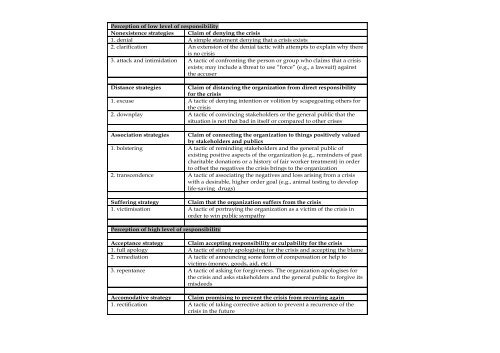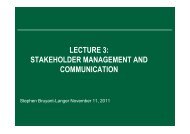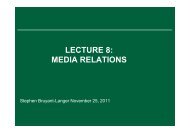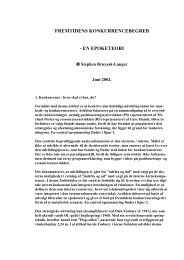LECTURE 10 ISSUE AND CRISIS MANAGEMENT
Lecture 10 November 30, 2011
Lecture 10 November 30, 2011
- No tags were found...
Create successful ePaper yourself
Turn your PDF publications into a flip-book with our unique Google optimized e-Paper software.
Perception of low level of responsibility<br />
Nonexistence strategies Claim of denying the crisis<br />
1. denial A simple statement denying that a crisis exists<br />
2. clarification An extension of the denial tactic with attempts to explain why there<br />
is no crisis<br />
3. attack and intimidation A tactic of confronting the person or group who claims that a crisis<br />
exists; may include a threat to use “force” (e.g., a lawsuit) against<br />
the accuser<br />
Distance strategies Claim of distancing the organization from direct responsibility<br />
for the crisis<br />
1. excuse A tactic of denying intention or volition by scapegoating others for<br />
the crisis<br />
2. downplay A tactic of convincing stakeholders or the general public that the<br />
situation is not that bad in itself or compared to other crises<br />
Association strategies Claim of connecting the organization to things positively valued<br />
by stakeholders and publics<br />
1. bolstering A tactic of reminding stakeholders and the general public of<br />
existing positive aspects of the organization (e.g., reminders of past<br />
charitable donations or a history of fair worker treatment) in order<br />
to offset the negatives the crisis brings to the organization<br />
2. transcendence A tactic of associating the negatives and loss arising from a crisis<br />
with a desirable, higher order goal (e.g., animal testing to develop<br />
life-saving drugs)<br />
Suffering strategy Claim that the organization suffers from the crisis<br />
1. victimisation A tactic of portraying the organization as a victim of the crisis in<br />
order to win public sympathy<br />
Perception of high level of responsibility<br />
Acceptance strategy Claim accepting responsibility or culpability for the crisis<br />
1. full apology A tactic of simply apologising for the crisis and accepting the blame<br />
2. remediation A tactic of announcing some form of compensation or help to<br />
victims (money, goods, aid, etc.)<br />
3. repentance A tactic of asking for forgiveness. The organization apologises for<br />
the crisis and asks stakeholders and the general public to forgive its<br />
misdeeds<br />
Accomodative strategy Claim promising to prevent the crisis from recurring again<br />
1. rectification A tactic of taking corrective action to prevent a recurrence of the<br />
crisis in the future














